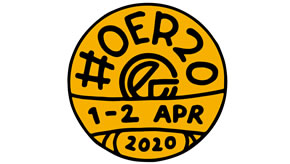 On 22nd January we ran a webinar for the Association for Learning Technology (ALT) where we discussed the relationship between copyright literacy and open practice. The resources from the webinar are online, including the slides, a recording and a Padlet where people shared their ideas and creative ways of understanding the relationship between the two concepts. We had a number of questions during the webinar including:
On 22nd January we ran a webinar for the Association for Learning Technology (ALT) where we discussed the relationship between copyright literacy and open practice. The resources from the webinar are online, including the slides, a recording and a Padlet where people shared their ideas and creative ways of understanding the relationship between the two concepts. We had a number of questions during the webinar including:
- Do open practices rely on a good understanding of copyright?
- Can we be open without understanding licensing?
 Openness is often equated with far more than just open licensing, however if we wish to share our teaching and research as widely as possible and be as inclusive as possible do we need to build openness onto a foundation of how copyright law and other types of intellectual property work in higher education? Additional questions we had included:
Openness is often equated with far more than just open licensing, however if we wish to share our teaching and research as widely as possible and be as inclusive as possible do we need to build openness onto a foundation of how copyright law and other types of intellectual property work in higher education? Additional questions we had included:
- Should we use only open access readings if we want to be truly open?
- What voices might be missing if we do this? Is openness really inclusive?
The participants shared their insights on what copyright literacy meant to them, and we had a lively discussion around the issues people raised. Some of the images on the Padlet demonstrated the relationship between the two concepts really well – I particularly liked the one where copyright literacy was shown as the wheels on the open practice car. However we also talked about how copyright culture was often at odds with scholarly culture, highlighting the blog post that Lizzie Gadd wrote a while ago on this topic. This led to a discussion about the inherent tension between the existence of copyright as a way of excluding access to certain material and the values behind openness. Some people even saw them as complete opposites. Some really interesting points were made during the chat including:
“I find people still frame openness with words such as ‘theft’ in conversation.” (Clare Thomson)
“‘open’ then where is the incentive to experts if there is no monetary reward?…I would love open access in everything – but how to build a framework that makes openness commercial?” (clairedobie)
“Openness is a stance. How to practice it requires copyright literacy so it should be an aspiration at least.” (Terese Bird)
“I think that too many voices may be missing if only open access materials were used – there’s a lot of privilege in being able to openly share publish. Not just financial.” (Sam Ahern)
Ada who joined us from Uruguay asked for some examples of how to teach students about copyright. Chris and I were able to share some examples of our own, such as when teaching students about Creative Commons and image attribution in the context of blog writing. Chris has taught a range of students in law and in creative digital arts about copyright in relation to their discipline. We both felt certain subjects do lend themselves to learning about copyright (art, music, graphic design, journalism) but that there was probably merit in teaching all students about the differences between copyright and plagiarism (see Chris’s presentation on copyright and plagiarism for IVIG 2019 in Prague)
We highlighted the Journal of Copyright Education and Librarianship as a good source of ideas on the topic of how to teach copyright. We also talked about the fact that the basics of copyright law are rarely taught at school though and there was a need to develop the copyright literacy of school teachers (in addition to academics).
Finally we ended for a bit of a plug for Icepops if people were interested in learning more about copyright education or sharing their experience and of course for the OER20 conference which is being held in London from the 1-2 April. Thanks to Martin Hawksey at ALT for hosting the webinar and to everyone who took part – it was great talking to you!
